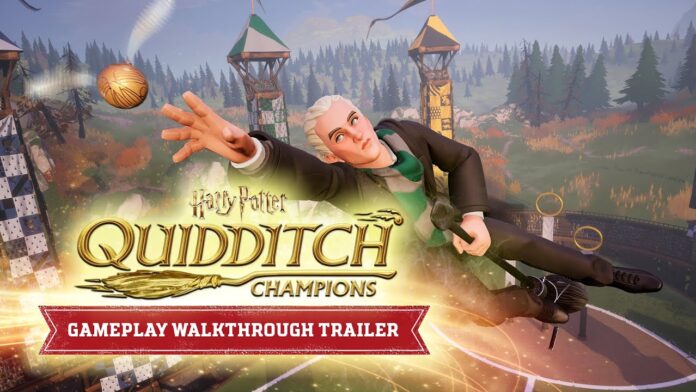Warner Bros. Discovery CFO confirms plans for a ‘Hogwarts Legacy’ sequel, marking it as a major growth initiative for the gaming division
Warner Bros. Games is planning a sequel to the successful 2023 video game Hogwarts Legacy, as revealed by Warner Bros. Discovery’s Chief Financial Officer Gunnar Wiedenfels. Speaking at Bank of America’s 2024 Media, Communications & Entertainment Conference, Wiedenfels noted that the development of a follow-up to Hogwarts Legacy is one of the company’s top priorities for the coming years.
Launched in February 2023, Hogwarts Legacy quickly became a massive hit, selling over 22 million copies by the end of the year. Its success boosted Warner Bros.’ gaming division, which has since faced challenges in replicating that level of achievement. Most recently, Suicide Squad: Kill the Justice League failed to meet the company’s expectations. Despite these challenges, Wiedenfels emphasized the strategic importance of the gaming business within Warner Bros. Discovery’s broader media strategy.
While the studio’s latest release, Harry Potter: Quidditch Champions, offers fans a chance to dive into the Wizarding World’s iconic sport, it doesn’t directly follow the story of Hogwarts Legacy. This new title, focused entirely on the beloved game of Quidditch, features familiar faces from the original Harry Potter series, including Harry, Ron Weasley, Hermione Granger, and Draco Malfoy. However, it does not tie into the narrative of Hogwarts Legacy, which is set many years before Harry Potter’s time at Hogwarts and features entirely new characters.
The enormous popularity of Hogwarts Legacy was fueled by its expansive open-world gameplay set in the Harry Potter universe. Players could immerse themselves in a pre-Harry era of Hogwarts, attending classes, exploring the castle and its grounds, and making moral choices that affected their character’s path. By the end of 2023, the game accumulated an impressive 707 million hours played, with many fans playing it multiple times to explore the various storylines tied to the four Hogwarts houses.
The development of a Hogwarts Legacy sequel represents a significant growth opportunity for Warner Bros. Games. Wiedenfels indicated that the next instalment in the Wizarding World gaming series is likely a few years away, but it remains a key project on the company’s strategic agenda. With Hogwarts Legacy having garnered both critical acclaim and commercial success, fans are eagerly awaiting news about what the next chapter in the saga will entail.
Analysis:
Political: The development of a Hogwarts Legacy sequel comes at a time when video game content, particularly those tied to major franchises, is increasingly intertwined with the political climate. The Harry Potter franchise, particularly its association with author J.K. Rowling, has faced controversy due to Rowling’s comments on gender identity issues. Warner Bros.’s decision to prioritize a sequel reflects a careful balancing act—capitalizing on the profitability of the Wizarding World while managing the broader cultural debates surrounding it. For the company, the commercial success of these games must be weighed against potential backlash from various political and social groups, making the gaming division a focal point of internal and external scrutiny.
Social: Hogwarts Legacy and its upcoming sequel are part of a broader trend in the gaming industry, where nostalgia plays a significant role in driving sales. Fans of the original Harry Potter series, who have grown up with the books and films, find a sense of connection in these games. The sequel’s announcement highlights the enduring appeal of immersive, open-world games that allow players to interact with a beloved universe. However, the conversation around these games also intersects with social issues. Many fans have raised concerns about Rowling’s stance on transgender issues, leading some to boycott her projects. This social tension could impact future sales, as Warner Bros. must navigate a fanbase that is both loyal and, in some segments, disillusioned.
Racial: The Harry Potter universe has historically faced criticism for its lack of racial diversity, and the success of Hogwarts Legacy presented an opportunity for Warner Bros. to broaden the representation within its games. While the original game made some strides in this area by offering a customizable player character of various ethnicities, there is still room for improvement. The forthcoming sequel will be under even more scrutiny to ensure that it better reflects diverse identities and experiences, especially as global conversations about representation in media continue to evolve. The game’s developers are likely aware of the need to make diversity and inclusion central to the experience, both in terms of character options and storytelling.
Gender: The gender dynamics within the Hogwarts Legacy universe, both in the game’s content and in the external discourse surrounding the Harry Potter franchise, continue to be a point of discussion. J.K. Rowling’s controversial views on gender have polarized many fans, and this tension may affect the perception of the sequel. Within the game itself, the ability for players to choose their character’s gender and gender expression has been a positive step, yet it will be essential for Warner Bros. to ensure that the sequel doesn’t alienate any segments of its diverse fanbase. A careful approach to gender representation, with inclusive options and sensitivity to modern gender identities, will likely be a crucial factor in the sequel’s reception.
Economic: The financial success of Hogwarts Legacy has had a profound impact on Warner Bros. Games’ economic outlook. As the gaming division becomes a core part of Warner Bros. Discovery’s growth strategy, the anticipated sequel represents a major opportunity for future revenue. With over 22 million copies sold in 2023, the franchise has proven to be a lucrative asset, and expectations for the sequel are high. However, the gaming market is highly competitive, and Warner Bros. must continue innovating to maintain the same level of success. The sequel’s development will require significant investment in production, marketing, and technology to meet the high standards set by its predecessor, all while competing with other major AAA games.
